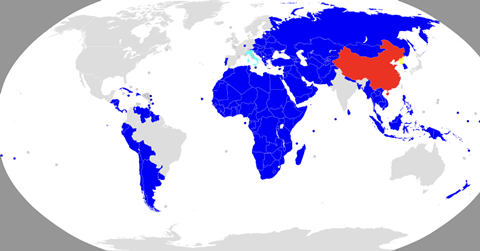Move marks a major shift in foreign policy for Colombia, which has traditionally been aligned with the US
Colombia has announced that it has joined China’s Belt and Road Initiative (BRI), a global strategy launched by Beijing in 2013 that seeks to strengthen its influence through infrastructure investments.

Colombian president Gustavo Petro formalised his accession during a meeting with his Chinese counterpart, Xi Jinping, in Beijing, within the framework of the fourth ministerial meeting of the China-CELAC Forum. The two leaders witnessed the signing of a cooperation plan to jointly build the Silk Road Economic Belt and the 21st Century Maritime Silk Road.
According to Ingrid Chaves, executive director of the Colombian-China Chamber of Investment and Commerce, joining the BRI “will bring many opportunities to increase foreign trade figures between Colombia and China”.
An example of this is the arrival of the Chinese shipping company Cosco Shipping to the port of Buenaventura, with a direct route from Shanghai. A new vessel would arrive each week, opening up new possibilities for exporting products like Colombian fruit and coffee to the Asian market.
Colombia’s decision marks a major shift in its foreign policy, traditionally aligned with the US. Petro emphasised that joining the BRI will boost exports, attract Chinese investment, and improve connectivity in the Colombian Pacific.
For his part, Xi Jinping promised a CNY66bn credit line for Latin America and highlighted bilateral cooperation in trade, technology, and infrastructure, including wind energy, electric vehicles, and artificial intelligence.
Colombia joins that of more than 140 countries that are already part of the BRI, which has so far mobilised US$1tn, according to the Chinese government. However, critics warn of the risk of debt and the potential repercussions for relations with the US, Colombia’s largest trading partner.



